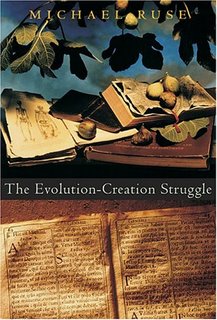
Despite the title of this book, Ruse doesn't actually discuss much of the interactions between Evolutionists and Creationists, much less the over-arching "struggle" that he names. What this book is mostly comprised of is the history of the study of evolution and its connection to Christian liberals called "progressivists". That is, what Ruse is mostly discussing is an ideology of "evolutionism", which is the blending of the science of evolution to support non-scientific (and mostly Christian) ideas of "progress". By progress, he means the idea that everything in the world is building to some better state in an absolute sense. That is, humans are better than ducks because we are higher on the evolutionary ladder, which ladder is meant to lead us all to some state of perfection. This movement is evidently synonymous with the post-millenialist movement of the mid to late 1800s, when optimism among American Christians was very high and before the newer Protestant churches came to prominence.
The book is really mostly a criticism of some modern scientists who carry on these progressivist ideas. He quotes some, notably Richard Dawkins (The Selfish Gene), in order to castigate them for promoting a "secular religion" called evolutionism. This is the version of proggresivism which depends on evolutionary science without any explicitly Christian connections. Although he provides a quite thorough historical background for this idea, I'm not entirely sure he's up to date. Dawkins, after all, is a central figure of the 70s. Stephen Jay Gould turned explicitly anti-progressivist (although Ruse still accuses him of some ideological thinking), and was probably the most popular evolutionist of the last quarter century.
I'm sure Gould gets more name recognition than Dawkins, but even if that wasn't true, I never encountered this "evolutionism" in any of my studies in anthropology. Most anthropologists are very careful to keep any non-scientific bias out of their work, so Ruse's claim that these ideas were still popular kind of stumped me. Obviously they were much more popular at one time, especially when European and American "scientists" were trying to prove such things as the superiority of whites over blacks (or any other color) and when fascist Germany was implementing a eugenics plan to keep the purity of the Aryan race from degrading.
Obviously there was a severe backlash to that kind of thinking, and Ruse says that as Americans turned more pessimistic, the premillenialist movement chose evolution as its target. Not necessarily because they didn't believe in the mechanics of evolution though. It's hard to quantify such things, but the majority of the movement may not even have been biblical literalists, but simply those who didn't believe in progressivism. As Ruse says, it's common to find that premillenialsts are literalists, but it's not a truism that one is the other.
Therefore, the struggle, as defined, isn't even necessarily between creationists and evolutionists, it's between progressivists and anti-progressivists. Now, creationists are definitely anti-progressivist, and adamantly opposed to the actual mechanics of evolution. Ruse, although he doesn't say so to the very end, in no way supportive of these folks despite his own anti-progressivist views. He is very much an evolutionist, and his purpose in writing this book was to examine how to approach the debate without adopting the ideals of evolutionism. He feels that evolution is on a much stronger ground when stripped of any implications for human values or morals, but that when it has religious implications (as in the case of evolution falsifying the Genesis account of creation), the evolutinist must be prepared to do battle on the same ground and not merely dismiss the two issues as being separate. In other words, if creationists want to put forth an argument for literal creation, the evolutionist must be prepared to fight back on the same terms and be strongly grounded in their knowledge of evolution.
He also goes on to criticize any "scientific" creationism such as Intelligent Design, which is a thinly veiled attempt to give creationism some scientific or factual footing, but which in the end appeals to the miraculous for explanation.
As for the history of creationism, he gives a tiny piece of it. Obviously creationism has a much longer history than the science of evolution, since science itself is a relatively modern concept. He mostly talks about it as the "funadementalist" response of the 20th century, and only as it impacts evolution.
It was a short book, and like "Divided by God", mostly useful for the history it gives of evolutionary thought and notable scientists in the field. I'm not sure I agree that "evolutionism" is really that much of a problem in the field, because I've never yet seen an example. But it's a short book and an easy read, so at least for the history it's worth it.
No comments:
Post a Comment